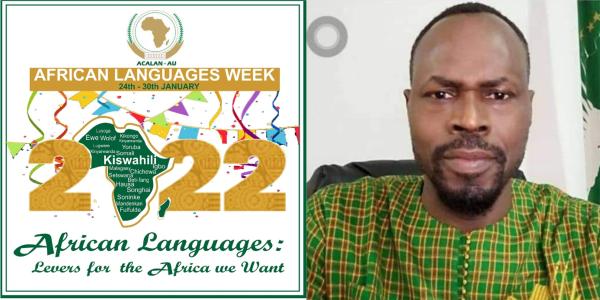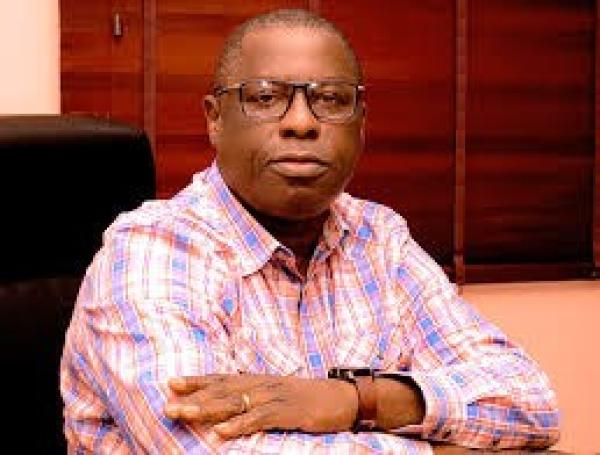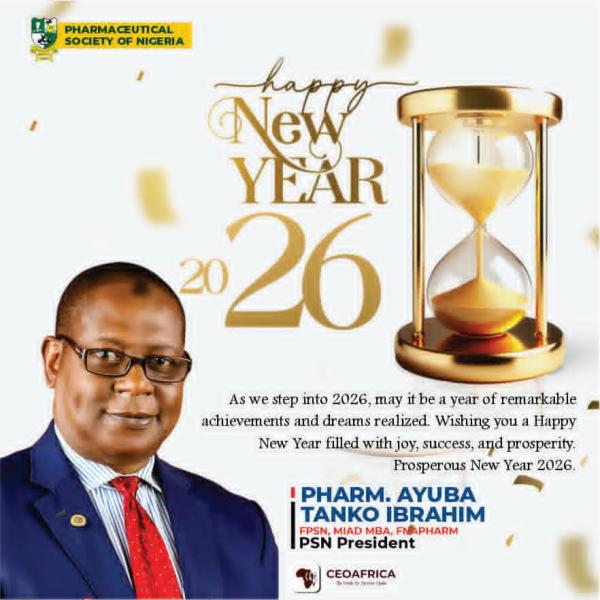
The Executive secretary of the African Academy of Languages ACALAN, a language agency of the African Union mandated to promote African languages in all domain of life has felicitated with Africans on the New Year 2022
In his statement, the ACALAN Executive Secretary appreciated the work Africans and Africans in diaspora have done in support of ACALAN’s common objective which is to develop and promote African languages.
Dampha further stated that the partnership that exists between African languages and foreign languages serves as a medium of development in most African countries.
He said, “We are cognizant of the partnership with the languages inherited from Africa’s colonial past (English, French, Portuguese, and Spanish) that have hitherto, assumed the function of medium of development in most African countries”.
“It is now self-evident that the use of both African languages and partner languages will guarantee that knowledge relevant for development is available and accessible to the vast majority of our people who use one of both categories of languages for their daily needs”.
“However, the use of only these foreign official languages means that available knowledge for development is accessible only to a minority (of about 40%) who has a reasonable level of functional knowledge of these languages”.
“This means that the majority of Africans (about 60%) who use uniquely or essentially an African language will thus be unwittingly marginalized and excluded in the development process.
“This is known to have been one of the major factors to the slow pace of realization of the United Nations Millennium Development Goals (2000-2015) and the current United Nations Sustainable Development Goals. This is the situation that the African Union seeks to redress via the instrumentality of the work of the African Academy of Languages (ACALAN); its specialized institution mandated to develop and promote African languages so that they can be used in all spheres of life in Africa. ACALAN’s role is to provide technical support to Member States for the formulation and implementation of language policies and strategies of language development and use”.
The executive secretary further stated some of the projects that has been done by the African Academy of languages to achieve their aims and objectives.
“In the effort to continue fulfilling its mandate, ACALAN is providing relevant guidance to policies favorable to the development and promotion of African languages, ACALAN has developed the Dar es Salam Framework for Action as a collective commitment to action for African Governments to ensure that Article 25 of the Constitutive Act of the African Uunion (Previously Article 29 of the Charterof the Organisation of African Unity) is implemented by promoting Kiswahili as a language of wider communication in Africa and other regional languages like Arabic for North Africa”.
“This commitment to enact the linguistic expression of the African Union's political will, serves as a means of promoting the African identity and linguistically, have African people make a place for themselves on the world stage. The adoption of Kiswahili as one of the official languages of the African Union is one loaded with huge potential for Africa”.
He further announced the launching of the African languages week and the need for all member states in African countries to observe the week.
In his word, “ACALAN officially launched the African Languages Week in Ouagadougou, in July 2021, in collaboration with the government of Burkina Faso, in line with its adoption by the Third Specialized Technical Committee on Youth, Culture and Sport of the African Union (STC-YCS3), in October 2018 in Algiers, Algeria, based on a proposal of the Executive Secretariat of the African Academy of Languages”.
“The African Languages Week is agreed to be a perpetual rendezvous and major annual event to be held from 24 to 30 January that should be observed by all member states of the African Union, to commemorate the relevance of African languages and cultures in Africa and the African Diaspora, as a special moment of the African identity and as a pathway of realizing Agenda 2063 of the African Union, specifically Aspiration 5 that promotes “An Africa with a strong cultural identity, common heritage, shared values and ethics”.”
Stating the importance of the African languages week, the executive secretary said that the week aim to increase awareness and appreciation of African languages by looking at pragmatic ways of empowering and rendering them relevant to the lives of African.
“The week also aim to promote the dynamics of African worldviews and philosophies of life, through the empowerment and use of African languages, and to demonstrate the indispensable role of African languages in promoting cooperation, integration and fostering cohesion and sustainable peace and development of Africa”
The ACALAN boss announced the theme for this year 2022 celebration as “African Languages: Levers for the Africa We Want.” He noted that the theme was recommended to be linked to the 2021 theme of the African Union, which is “Arts, Culture and Heritage: Levers for Building the Africa We Want.”
He however stated that there was a coordinating committee in charge of giving the theme. He said the committee was established by the Executive Secretariat of ACALAN as a standing Committee with a tenure of five years renewable only once, adhering as much as possible, to the African Union gender parity policy from the six regions of the Organization, i.e., Central, East, North, Southern, West Africa and the Diaspora.
“The main role of the Committee is to stimulate more dynamism for the development and promotion of African languages across the African continent and in the African Diaspora by assisting ACALAN in the annual celebration and to ensure the smooth running of the activities of the African Languages Week by proposing the theme for each year, and mobilizing resources (human, technical and financial) for planning and organizing the activities of the week throughout the continent and in the Diaspora, in collaboration with National Language Structures in the Member States serving as ACALAN’s national focal institutions”
The executive secretary went further by stating some of the project that has been done by the African Academy of languages to keep up with their mandate.
“ACALAN has embarked on the Linguistic Atlas Project, whose objectives are to determine precisely the number of existing African languages, their status, their interrelation, and dialectical variations. The continental management structure of the project has been established, including the Continental and Regional Coordinators and the National Coordinating Committees. The project has now progressed to the map production stage for West and some parts of East Africa”.
“More than three (3) million terms have been harvested and processed for the Kiswahili corpus project: http://www.kiswahili-acalan.org,as a component of the African Languages and Cyberspace programme. The corpus project is being extended to other vehicular cross-border languages such as Beti-fang, Cyanja/Chichewa, Fulfulde, Hausa, Kikongo, Mandenkan, Setswana, Lingala, Somali and Malagasy, which will provide a model for furthering the work across all African languages”.
The executive secretary stated how it has empowered African languages up till this present time using the communication platform like TV and radio
He said, “To empower African languages more effectively, ACALAN has embarked on projects such the Pan-African Centre for Interpretation and Translation(PACIT), whose aim is to train Africans in the profession of translation and interpretation so as to enable African languages become true working languages and languages of instruction in a multilingual context; the ACALAN Interactive and Comprehensive Platform for African Languages (ICPAL), a radio station and a TV platform for African languages to reach out to rural communities in their languages and raise the visibility of ACALAN in the member states of the African Union.
“We have considered revising the Language Plan of Action for Africa for its effective implementation in the Member States of the African Union and are proposing the adoption of a Decade of African Languages alongside the United Nations International Decade of Indigenous Languages 2022 – 2032, by the coming Specialized Technical Committee, Youth Culture and Sport (STC-YCS4)”.
“The harmonization of the writing systems and creation of terminologies for vehicular cross-border languages, should empower them to assume their role as languages of integration; giving impetus to research on African languages in collaboration with language research institutions and other institutions such as the media by developing and coordinating research activities on languages and collecting and disseminating the results of linguistic research, archiving documents and creating data banks relating to African languages have been part of our activities”.
He however outlines four things ACALAN will continue to do to promote African languages.
“We will continue to put more emphasis on providing technical support to Member States to formulate and implement language policies, and having them establish and/or designate national structures for the promotion of African languages; collaborating with African regional institutions and organizations responsible for culture and languages, with a view to strengthening partnership and complementarity; modernizing African linguistic tools through the use of Information and Communication Technologies, thus making it possible to effectively bridge the digital divide; training teachers in First Language (L1) methodologies as a factor for promoting the use of African languages as a medium of instruction and as official and working The Executive secretary of the African Academy of Languages ACALAN, a language agency of the African Union mandated to promote African languages in all domain of life has felicitated with Africans on the New Year 2022
In his statement, the ACALAN Executive Secretary appreciated the work Africans and Africans in diaspora have done in support of ACALAN’s common objective which is to develop and promote African languages.
Dampha further stated that the partnership that exists between African languages and foreign languages serves as a medium of development in most African countries.
He said, “We are cognizant of the partnership with the languages inherited from Africa’s colonial past (English, French, Portuguese, and Spanish) that have hitherto, assumed the function of medium of development in most African countries”.
“It is now self-evident that the use of both African languages and partner languages will guarantee that knowledge relevant for development is available and accessible to the vast majority of our people who use one of both categories of languages for their daily needs”.
“However, the use of only these foreign official languages means that available knowledge for development is accessible only to a minority (of about 40%) who has a reasonable level of functional knowledge of these languages”.
“This means that the majority of Africans (about 60%) who use uniquely or essentially an African language will thus be unwittingly marginalized and excluded in the development process.
“This is known to have been one of the major factors to the slow pace of realization of the United Nations Millennium Development Goals (2000-2015) and the current United Nations Sustainable Development Goals. This is the situation that the African Union seeks to redress via the instrumentality of the work of the African Academy of Languages (ACALAN); its specialized institution mandated to develop and promote African languages so that they can be used in all spheres of life in Africa. ACALAN’s role is to provide technical support to Member States for the formulation and implementation of language policies and strategies of language development and use”.
The executive secretary further stated some of the projects that has been done by the African Academy of languages to achieve their aims and objectives.
“In the effort to continue fulfilling its mandate, ACALAN is providing relevant guidance to policies favorable to the development and promotion of African languages, ACALAN has developed the Dar es Salam Framework for Action as a collective commitment to action for African Governments to ensure that Article 25 of the Constitutive Act of the African Uunion (Previously Article 29 of the Charterof the Organisation of African Unity) is implemented by promoting Kiswahili as a language of wider communication in Africa and other regional languages like Arabic for North Africa”.
“This commitment to enact the linguistic expression of the African Union's political will, serves as a means of promoting the African identity and linguistically, have African people make a place for themselves on the world stage. The adoption of Kiswahili as one of the official languages of the African Union is one loaded with huge potential for Africa”.
He further announced the launching of the African languages week and the need for all member states in African countries to observe the week.
In his word, “ACALAN officially launched the African Languages Week in Ouagadougou, in July 2021, in collaboration with the government of Burkina Faso, in line with its adoption by the Third Specialized Technical Committee on Youth, Culture and Sport of the African Union (STC-YCS3), in October 2018 in Algiers, Algeria, based on a proposal of the Executive Secretariat of the African Academy of Languages”.
“The African Languages Week is agreed to be a perpetual rendezvous and major annual event to be held from 24 to 30 January that should be observed by all member states of the African Union, to commemorate the relevance of African languages and cultures in Africa and the African Diaspora, as a special moment of the African identity and as a pathway of realizing Agenda 2063 of the African Union, specifically Aspiration 5 that promotes “An Africa with a strong cultural identity, common heritage, shared values and ethics”.”
Stating the importance of the African languages week, the executive secretary said that the week aim to increase awareness and appreciation of African languages by looking at pragmatic ways of empowering and rendering them relevant to the lives of African.
“The week also aim to promote the dynamics of African worldviews and philosophies of life, through the empowerment and use of African languages, and to demonstrate the indispensable role of African languages in promoting cooperation, integration and fostering cohesion and sustainable peace and development of Africa”
The ACALAN boss announced the theme for this year 2022 celebration as “African Languages: Levers for the Africa We Want.” He noted that the theme was recommended to be linked to the 2021 theme of the African Union, which is “Arts, Culture and Heritage: Levers for Building the Africa We Want.”
He however stated that there was a coordinating committee in charge of giving the theme. He said the committee was established by the Executive Secretariat of ACALAN as a standing Committee with a tenure of five years renewable only once, adhering as much as possible, to the African Union gender parity policy from the six regions of the Organization, i.e., Central, East, North, Southern, West Africa and the Diaspora.
“The main role of the Committee is to stimulate more dynamism for the development and promotion of African languages across the African continent and in the African Diaspora by assisting ACALAN in the annual celebration and to ensure the smooth running of the activities of the African Languages Week by proposing the theme for each year, and mobilizing resources (human, technical and financial) for planning and organizing the activities of the week throughout the continent and in the Diaspora, in collaboration with National Language Structures in the Member States serving as ACALAN’s national focal institutions”
The executive secretary went further by stating some of the project that has been done by the African Academy of languages to keep up with their mandate.
“ACALAN has embarked on the Linguistic Atlas Project, whose objectives are to determine precisely the number of existing African languages, their status, their interrelation, and dialectical variations. The continental management structure of the project has been established, including the Continental and Regional Coordinators and the National Coordinating Committees. The project has now progressed to the map production stage for West and some parts of East Africa”.
“More than three (3) million terms have been harvested and processed for the Kiswahili corpus project: http://www.kiswahili-acalan.org,as a component of the African Languages and Cyberspace programme. The corpus project is being extended to other vehicular cross-border languages such as Beti-fang, Cyanja/Chichewa, Fulfulde, Hausa, Kikongo, Mandenkan, Setswana, Lingala, Somali and Malagasy, which will provide a model for furthering the work across all African languages”.
The executive secretary stated how it has empowered African languages up till this present time using the communication platform like TV and radio
He said, “To empower African languages more effectively, ACALAN has embarked on projects such the Pan-African Centre for Interpretation and Translation(PACIT), whose aim is to train Africans in the profession of translation and interpretation so as to enable African languages become true working languages and languages of instruction in a multilingual context; the ACALAN Interactive and Comprehensive Platform for African Languages (ICPAL), a radio station and a TV platform for African languages to reach out to rural communities in their languages and raise the visibility of ACALAN in the member states of the African Union.
“We have considered revising the Language Plan of Action for Africa for its effective implementation in the Member States of the African Union and are proposing the adoption of a Decade of African Languages alongside the United Nations International Decade of Indigenous Languages 2022 – 2032, by the coming Specialized Technical Committee, Youth Culture and Sport (STC-YCS4)”.
“The harmonization of the writing systems and creation of terminologies for vehicular cross-border languages, should empower them to assume their role as languages of integration; giving impetus to research on African languages in collaboration with language research institutions and other institutions such as the media by developing and coordinating research activities on languages and collecting and disseminating the results of linguistic research, archiving documents and creating data banks relating to African languages have been part of our activities”.
He however outlines four things ACALAN will continue to do to promote African languages.
“We will continue to put more emphasis on providing technical support to Member States to formulate and implement language policies, and having them establish and/or designate national structures for the promotion of African languages; collaborating with African regional institutions and organizations responsible for culture and languages, with a view to strengthening partnership and complementarity; modernizing African linguistic tools through the use of Information and Communication Technologies, thus making it possible to effectively bridge the digital divide; training teachers in First Language (L1) methodologies as a factor for promoting the use of African languages as a medium of instruction and as official and working languages
The Executive secretary, Dr Dampha called on all stakeholders to support African Languages for a prosperous, healthy and integrated Africa.
Languages
The Executive secretary, Dr Dampha called on all stakeholders to support African Languages for a prosperous, healthy and integrated Africa.





















